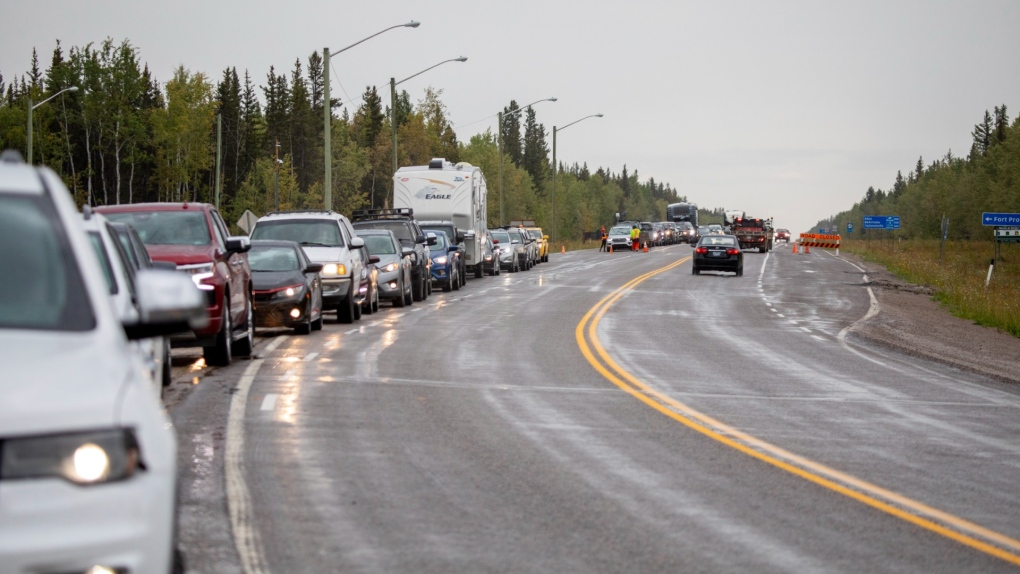rewrite this content and keep HTML tags
The mayor of Yellowknife is urging the city’s last remaining residents to leave for safer areas, stressing that while a nearby fire has not touched the territorial capital, it is still not safe for people to return or stick around.
Officials in the Northwest Territories, where about half of the population has been displaced due to ongoing wildfires, said in an update Friday evening that more than 19,000 people have left Yellowknife to date.
Of the 2,600 people still left in the capital, 1,600 are considered non-essential workers.
“It happens in every community that is trying to evacuate,” Yellowknife Mayor Rebecca Alty told CTV News Channel on Saturday.
“There’s a few folks that just want to stay and protect their property or they don’t think it’s real, they think it’s not a threat, so it’s a challenge, but we’ll continue to stress — now is the time to leave. The time is not when it’s actually a critical emergency.”
Alty said the reason is so crews who are helping to protect the community can “focus on the threat at hand and not trying to get people out of the way of the danger.”
“So, again, really encourage anybody, if your family is still here, keep trying to encourage them to leave,” she added.
Yellowknife, a city of about 22,000 people, and other communities in the Northwest Territories are currently under an evacuation order and the territorial government has declared a state of emergency because of the fires.
Most residents have fled to Alberta and Manitoba by road and evacuation flights.
The B.C. government, meanwhile, has also declared a state of emergency due to fires there, namely in the West Kelowna area.
Officials in the Northwest Territories have been monitoring a fire 15 kilometres to the northwest of Yellowknife, especially with winds shifting and blowing to the east.
Crews have created firebreaks, or strips of land that are cleared of trees and brush that could fuel fires, and used sprinklers and air tankers to help stop the fire from potentially spreading.
“While there remains a possibility that this fire reaches the outskirts of Yellowknife by the end of the weekend given wind conditions, the risk of this timeline has fallen with a little help from weather and some successful days of firefighting,” an update from the Northwest Territories government Friday evening said.
The territorial government adds that while conditions have been cooler than forecast, Sunday could see a return to hotter temperatures in the 20s combined with westerly winds.
“More tough days ahead – but some good days of limited growth is always good news.”
Alty said while there has been some rain, it is still not enough to control the fire.
“I don’t want to paint the over-positive picture because I also have heard, ‘Oh, OK, it’s safe to come back.’ No, no, no, no, it’s not,” she said.
RADIO STATION FEELS ‘STUNTED’ OVER META BLACKOUT
Devin Bellinger, programming director for 100.1 True North Radio in Yellowknife, told CTV News Channel that he saw people at local grocery stores and trying to fill up their vehicles on Friday.
“There’s a lot of mixed feelings about people leaving on their own accord,” he said. “Maybe some people were getting their last-minute supplies yesterday, but there were also a lot of people who did leave.”
Bellinger has chosen to stay behind but said he has plans in place to leave by air or vehicle if he needs to.
Highway 3, the only major roadway in or out of Yellowknife, remains open and officials say thousands of people and vehicles have already left the city.
“If the fires breach the city, I’m sure a lot of those people who would stay behind will probably take off at that point,” Bellinger said.
However, he said the ability to communicate to listeners and readers through social media has been “stunted” due to Meta, the parent company of Facebook and Instagram, blocking some Canadians from seeing news on their platforms in opposition to the federal government’s Online News Act.
The law forces companies such as Meta and Google to develop agreements to compensate news companies for sharing their content.
Meta said in a statement Thursday that Canadians could still use the company’s platforms “to connect with their communities and access reputable information, including content from official government agencies, emergency services and non-governmental organizations.”
Content posted on the Facebook page for 100.1 True North could not be viewed by CTVNews.ca at the time of publication.
“We are able to still update our website and the problem is it’s hard to reach everyone who’s evacuated, who follows our social (media pages) because of this,” Bellinger said.
“And whoever is to blame for it, it’s certainly something that tech giants should consider in emergency situations like this.”
News Media Canada, the Canadian Association of Broadcasters and the CBC have filed a request to the Competition Bureau to investigate and prohibit Meta from blocking news on its platforms. CTV News is a division of Bell Media, which is a member of the Canadian Association of Broadcasters.
With files from CTV National News Alberta Bureau Chief Bill Fortier

